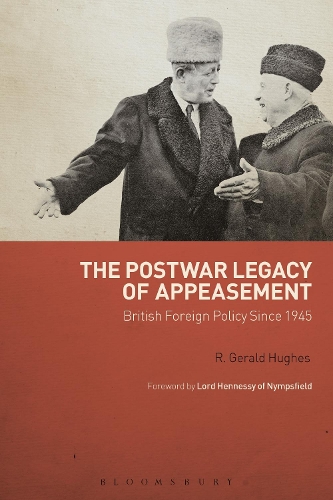
The Postwar Legacy of Appeasement: British Foreign Policy Since 1945
(Paperback)
Available Formats
Publishing Details
The Postwar Legacy of Appeasement: British Foreign Policy Since 1945
By (Author) R. Gerald Hughes
Bloomsbury Publishing PLC
Bloomsbury Academic
16th January 2014
United Kingdom
Classifications
General
Non Fiction
International relations
327.41009045
Physical Properties
Paperback
352
Width 156mm, Height 232mm, Spine 20mm
540g
Description
Focusing on the Cold War and the post-Cold War eras, R. Gerald Hughes explores the continuing influence of Appeasement on British foreign policy and re-evaluates the relationship between British society and Appeasement, both as historical memory and as a foreign policy process. The Postwar Legacy of Appeasement explores the reaction of British policy makers to the legacies of the era of Appeasement, the memory of Appeasement in public opinion and the media and the use of Appeasement as a motif in political debate regarding threats faced by Britain in the post-war era. Using many previously unpublished archival sources, this book clearly demonstrates that many of the core British beliefs and cultural norms that had underpinned the Chamberlainite Appeasement of the 1930s persisted in the postwar period.
Reviews
Hughes has made a major contribution to understanding British foreign policy in the post-war era ... [A] highly original work that will reward study by anyone interested in the history of international relations. -- George C. Peden, University of Stirling * Intelligence and National Security *
Gerald Hughes' first-rate book deserves to be read and digested not only by historians and international relations specialists, but also by politicians, their speech writers and their diplomats. -- Christopher Waters, Deakin University * Australian Journal of Politics and History *
Hughes has produced a readable account of the uses and abuses of the appeasement analogy, reminding us of the dangers of history turning into a political battleground on which the decisions for the future are made. -- Helene von Bismarck, Independent Scholar * American Historical Review *
[Hughes] presents the argument in a manner likely to retain the interest of the reader whilst resisting the temptations towards over simplification. It is a highly interesting book that would be of interest to scholars and students alike. -- Andrew Crines * The Historian *
Author Bio
R. Gerald Hughes is Reader in the Department of International Politics at Aberystwyth University, UK.
